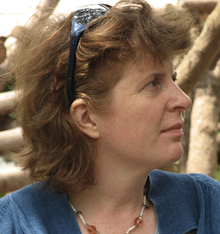An interview with Rebecca Swift

Rebecca Swift
Rebecca Swift founded The Literary Consultancy – www.literaryconsultancy.co.uk – the country’s (and perhaps the world’s) first and leading manuscript assessment service, in 1996. She has seen a few changes in the intervening years but nothing quite like the explosion that is self publishing. I met up with Rebecca earlier this week.
Patsy: What differences has self publishing made to the book world in your experience?
Rebecca: It is a radical revolution. Some writers can make it work better than others. A good enough writer who is excellent at self promotion stands a better chance of success than the good writer who lacks marketing skills. It helps to be technically savvy of course. Recently I have seen two very different kinds of writer who have come through TLC’s assessment service turn to self-publishing out of frustration at not being taken on by agents, despite their work being of a good standard. The commercial novelist Tina Seskis is doing well on Amazon with her novel One Step Too Far. Tina had a marketing background and also spent money on marketing through Netgalley [netgalley.com] which she thinks is helpful and helped her get online reviews. Sales are unpredictable however; a charming and informative self published memoir on project management called Project Management: All You Need is Love by Pete Smith is not selling as well on Amazon as we expected which may be because the author isn’t a marketer, but also of course because the book isn’t so obviously commercial.
Self publishing is trumpeted as ‘free’ but there are costs involved – for editing, copy editing and/or proof reading and cover design – and the more successful self publishers also spend money on marketing. It’s no good just uploading your book onto Amazon and waiting for something to happen. Amazon helps people who help themselves with their own marketing strategies. There are companies springing up now who will market your book for a percentage of the sales, such as epubli [epubli.co.uk] and Acorn Publishing [acornselfpublishing.com]. The rules that apply to traditional publishing apply equally to self publishing, if not more so. While it is possible to self publish a book that covers different genres Amazon itself is still quite conservative, and as in traditional publishing ‘genre’ books – crime and commercial fiction in particular – are still the best sellers. Along with fan fiction.
P: What is fan fiction?
R: It’s where a writer takes famous characters from literature – such as Mr Darcy – and weaves a fictional tale around them. Amazon is planning on publishing and even commissioning fan fiction. We have a wonderful editor who works for us, Sally O J, who is going to be talking at our conference about this rising phenomenon.
P: Without the backing of a traditional publisher to give a book credibility it is difficult for the reader to separate the quality self published books from the rest. Is there a way that an organisation with the reputation such as TLC’s can act as a kind of curator, or ‘gatekeeper’ (for lack of another word)?
R: Quite possibly, and we are looking for a way to make this work. I’d say watch this space – as we see a great deal of talent come through our books and we want to help those who go on to self-publish get discovered.
We have lists of recommended editors and copy editors, but we still feel there is a moral responsibility to ensure that people know exactly what they are buying and why, whereas some companies are now just selling expensive authors’ services, as they are called, to anybody. There are companies on the rise however who are looking to offer real value to writers who self-publish, but writers should be very careful about their expectations and what they are buying from whom.
P: Do you have any specific advice for a writer who is contemplating self publishing?
R: Do your research well before parting with money. The Alliance of Independent Authors (Alli) I understand helps writers keep in touch about what works and what doesn’t in self-publishing. And of course, get a proper editorial assessment to help you get your work as good as it can be, and to understand its weaknesses as well as its strengths. Our conference should be genuinely useful to people wanting to find out more.

The Free Word Centre
TLC’s conference Writing in a Digital Age takes place at the Free Word Centre at 60 Farringdon Road on June 7 and 8. For more information and booking details visit
www.literaryconsultancy.co.uk/events/info /





